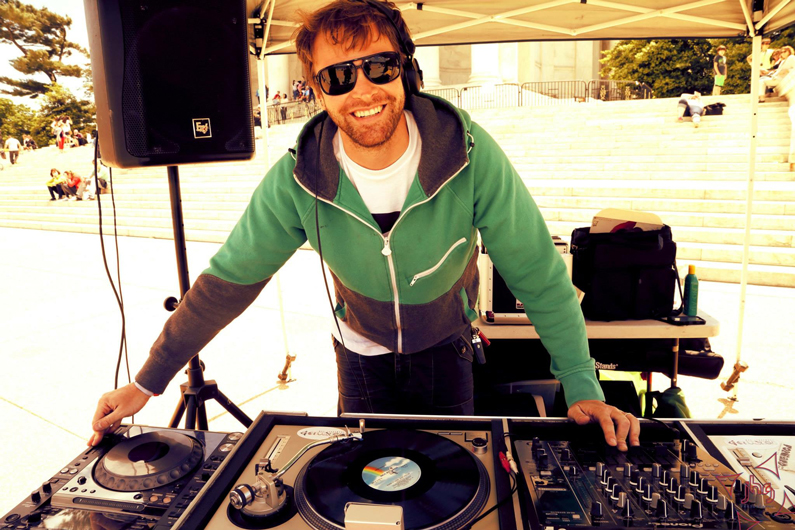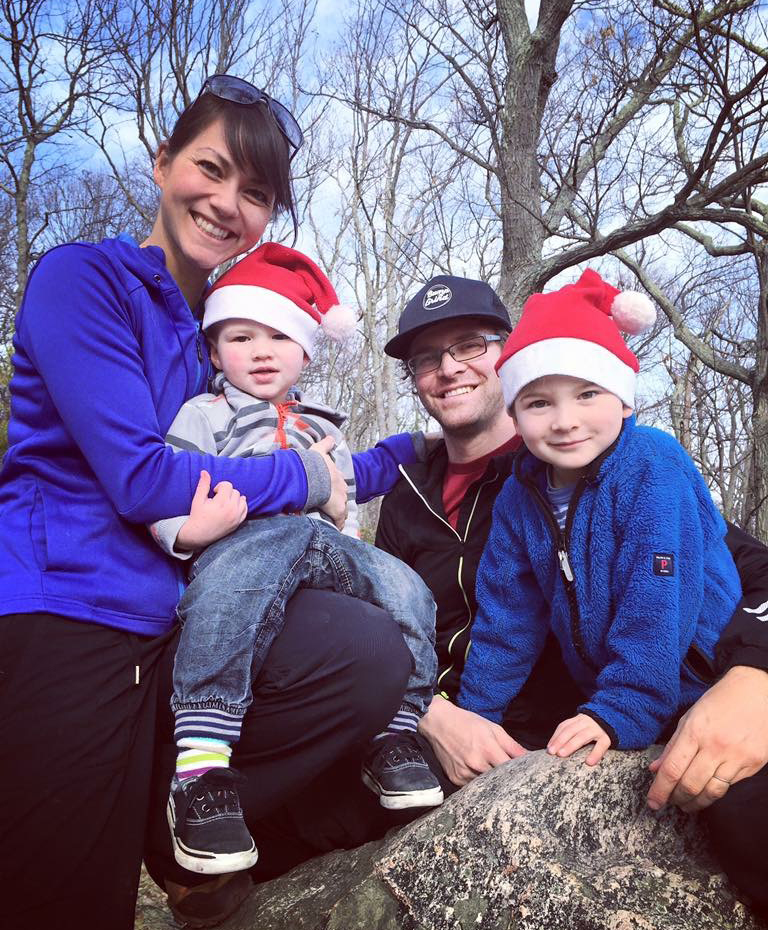Content on this webpage is provided for historical information about the NIH Clinical Center. Content is not updated after the listed publication date and may include information about programs or activities that have since been discontinued.

When David Fogel had a stomach, his fast-paced life was focused on expanding Bump 'n Grind, his coffee shop and record store in downtown Silver Spring, and managing a creative agency and two co-working spaces. Incorporated into his busy schedule was raising his two little sons with his wife.
Early in October 2016, a family member who is also a gastroenterologist contacted David's father and said, "We think that 15 years ago, your sister passed away from stomach cancer caused by a gene mutation. Because this gene mutation is hereditary, you guys should probably get tested to see if you also have it." David, and two other members of his family followed the recommendation and together went to a genetic counselor for testing. While the results were negative for David's family members, David's tests were positive for the gene mutation.
He was diagnosed with hereditary diffuse gastric cancer (HDGC) caused by a mutation in his CDH1 gene. Having HDGC does not always mean that a person actually has cancer. But, it can mean, as in David's case, that the risk of getting diffuse gastric, a rare cancer representing approximately 2% of all stomach cancers, increases to almost 80%.

David and his family talked to many doctors and specialists about his options and learned that in its early stages, diffuse gastric cancer has no specific symptoms and does not form a tumor that can be seen with screening. However, by the time that symptoms develop and screening tools can detect a tumor, the cancer is often at a very advanced stage and with a poor survival rate. All of the possibilities that he explored ended with the recommendation that people with the CDH1 gene should have their stomach removed before the cancer can develop.
David's search for options and answers led him to Dr. Jeremy L. Davis, a principal investigator on gastric cancer clinical studies and a surgical oncologist at the National Cancer Institute (NCI). Davis is also the surgeon-in-chief at the NIH Clinical Center and a member of the NIH Foregut Team, research and clinical experts who work together to provide comprehensive patient care for esophageal, stomach, pancreas and bile duct diseases.
David shared his emotions, "I felt incredibly fortunate to be able to enroll in a clinical study at the NCI and have the surgery done at the NIH Clinical Center. Working with Dr. Davis and his team was comfortable and reassuring. At the Clinical Center, nothing was pushed on me or rushed and everything was very transparent. This was a very different experience than what I experienced when I started this journey with other hospitals and medical teams. Hopefully my stomach will help doctors to better understand the CDH1 gene mutation and discover a preventative treatment or cure."
It took around five hours for Davis and his team to completely remove David's stomach and attach his esophagus directly to his small intestine. The day after the surgery, David was up and walking and taking some sips of water to make sure that his reengineered digestive system was in working order.
"I wouldn't say any part of the recovery has been debilitating. However, the challenge is slowing down and changing what and how I eat," David said.
Without a stomach, the process of breaking down food must begin in your mouth, in tiny amounts at a time. The small intestine then completes the job of breaking down food and extracting the nutrients. David used to only eat two large meals each day. Now, he has a watch with an alarm that reminds him to eat every two hours.
"I'm constantly nibbling and trying to make sure that I eat enough calories and protein so that I don't end up losing too much weight", David explained. "My new daily diet currently consists of: two scrambled eggs in the morning, a couple of cheese or peanut butter sandwich crackers, shepherd's pie or chicken pot pie for lunch, a protein shake; salmon or chicken for dinner, maybe peanut butter and apples for dessert, and iron, calcium, and B12 supplements."
He is also learning to be extra careful with reading food labels because he cannot eat anything with sugar listed in the first three ingredients. Sugar causes food to move too quickly through the small intestine and can cause severe symptoms including dizziness, rapid heartbeat, pain, cramping and weakness.
David shared his optimism on his new life without a stomach, "When I look at where I am right now, I thought my life without a stomach would have been a lot more disrupted than it has been. While I don't have the same level of energy that I had pre-surgery, I know that it will return. I'm eating a much better diet and I feel really fortunate to be alive. My aunt who passed away from stomach cancer at the age of 56 did not have this option that was presented to me. While I'm not a religious person, I do believe that my aunt and grandmother have been with me, looking down at me during this entire process: happy, thankful, and cheering me on."
David was recently featured on NBC Washington News 4 talking about his journey to living without a stomach. His care provider, Dr. Jeremy Davis was also featured, highlighting the important research being conducted in the NIH Clinical Center.
Learn more about rare disease research at the NIH Clinical Center and the annual Rare Disease Day at NIH cohosted by the NIH Clinical Center and the National Center for Advancing Translational Sciences.

